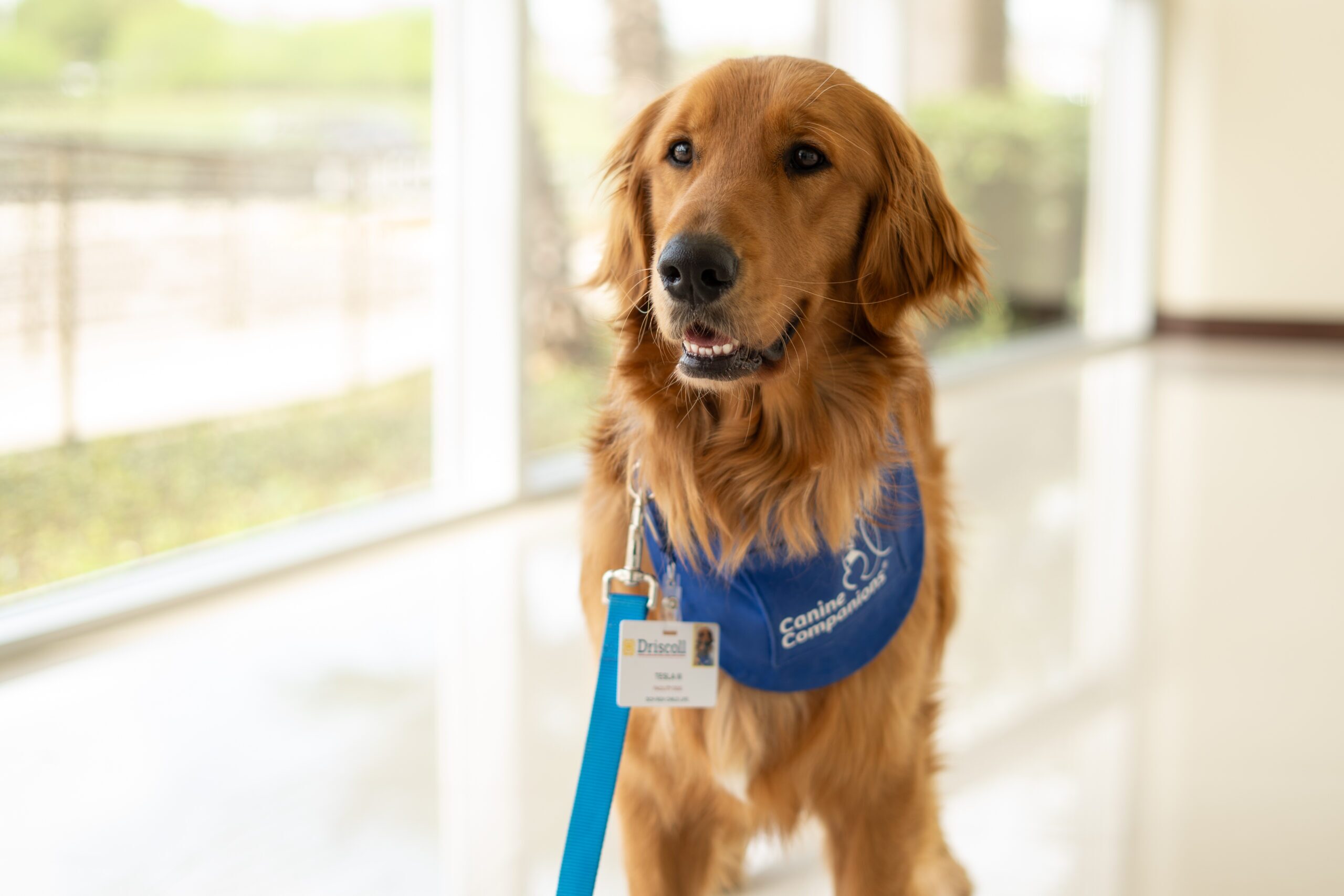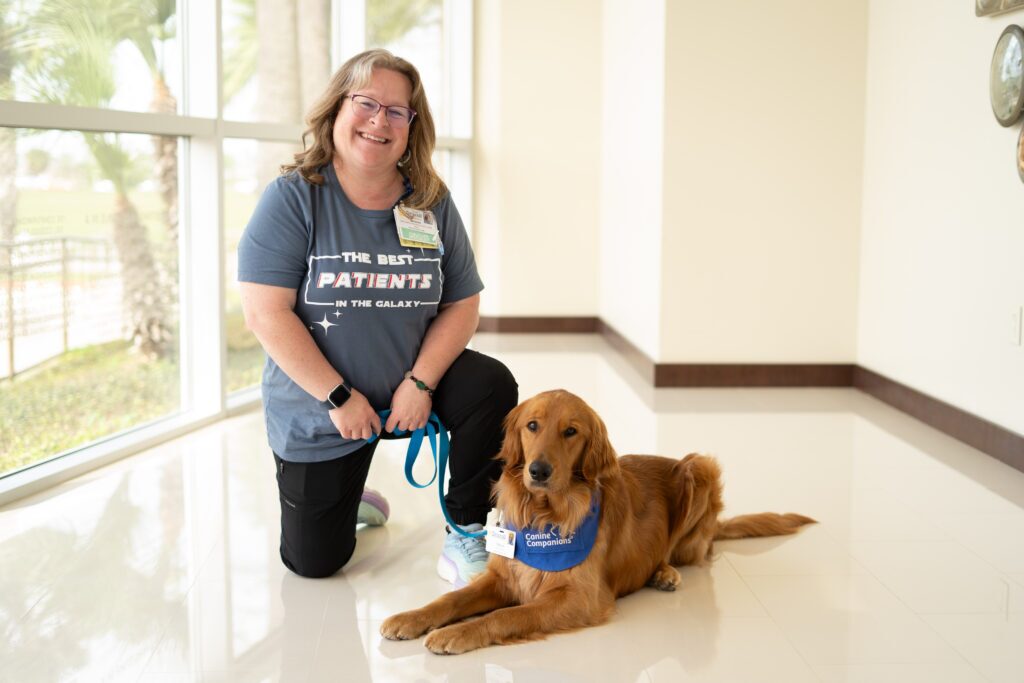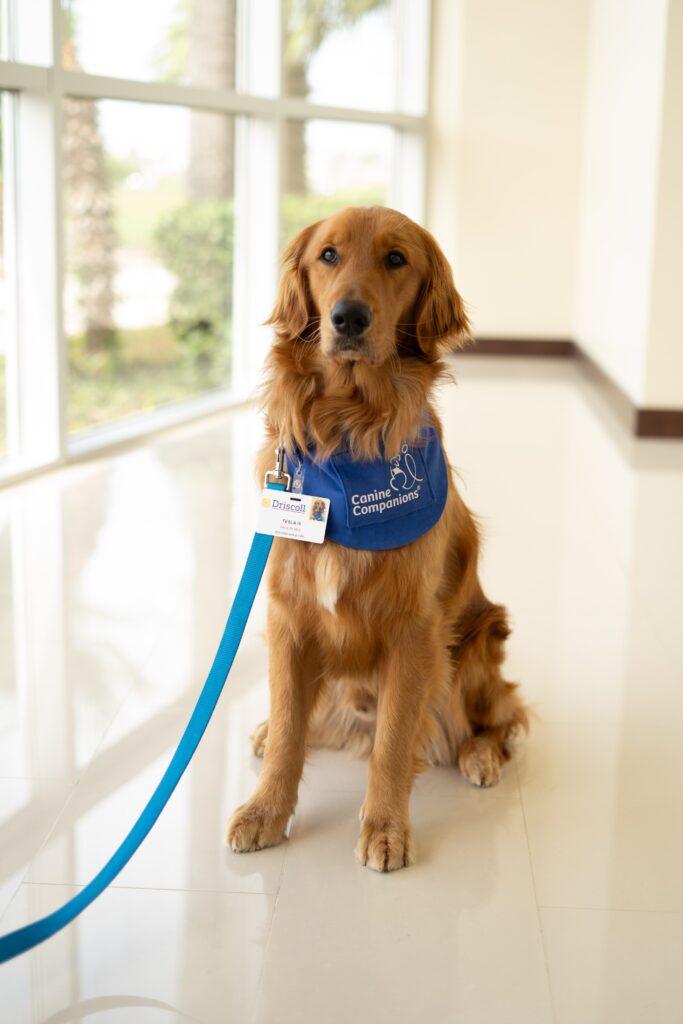Meet the Driscoll hospital employee with four legs and a heart of gold

Driscoll takes a holistic approach to care, and one special team member is making a big difference — on four legs. At Driscoll Children’s Hospital Rio Grande Valley, you’ll meet Tesla, the 2 ½ year-old golden retriever who helps kids through some of their toughest moments.
Trained by Canine Companions® as a service/facility dog, Tesla works alongside doctors, nurses and staff, meeting patient needs in unique ways. He often arrives just when he’s needed most — connecting with pediatric patients in ways that words can’t.
Meghan Kamau, the Child Life and Therapeutic Arts Coordinator at Driscoll RGV and Tesla’s handler, has seen this firsthand.
“Even with all the usual distractions and support, some patients can remain distressed and resistant to medical procedures,” Kamau explained. “But when Tesla is brought in, he instinctively knows what to do to help a child, who may have been scared and resisting, become calm enough for the medical team to complete their work.”
And that’s the Driscoll difference. As the first freestanding designated children’s hospital in the Valley, Tesla will help fulfill its mission of serving a region that’s home to more than half a million children.
For years, Driscoll Children’s Hospital in Corpus Christi has been a lifeline for families in South Texas, starting as the area’s first children’s hospital and pediatric emergency room in 1953. With this new location in the vibrant Valley, Driscoll’s legacy of compassionate care reaches even further.
Families near and far receive support from a dedicated team of medical professionals, specialists, administrators and volunteers. Together, they make sure that every child, no matter the challenges they face, gets expert care that’s close to home.
They won’t face the road to wellness alone. And what better companion to have by their side than Tesla, the golden with a heart that’s just as bright.

Heart of gold
Tesla is a facility dog, not a therapy dog — a key difference, points out Kamau. Unlike therapy dogs, which are usually family pets of volunteers that are therapy certified and visit hospitals occasionally, facility dogs like Tesla are trained service dogs who work full-time, offering consistent support to patients, families and staff.
“He is considered an employee and works 40-plus hours a week on my schedule,” Kamau explained. “This means Tesla is available when needed, providing a continuity of care that therapy dogs, with their limited schedules, can’t match.”
Tesla’s presence at Driscoll Children’s Hospital Rio Grande Valley fits perfectly with the hospital’s comprehensive approach to care. Children in hospitals often face difficult procedures and long recoveries. Tesla eases their fears and provides comfort, whether it’s a quick cuddle before surgery or playing fetch in the hallway.
Tesla tailors his approach to each child’s needs. “He just knows,” Kamau explained. “With certain patients, he knows he needs to be extra calm and slowly get in the bed and just lie down with them... versus other patients, it’s high energy, and running up and down the hallway, playing with them.”

Tesla also helps hospital staff. In the oncology wing, where Kamau’s office is located, a young patient was struggling with pain and anxiety from cancer treatments. This child was scared to ride his tricycle after surgery, even with help from physical therapy team members.
Enter Tesla.
The boy, who initially didn’t want to pedal, agreed to hold Tesla’s leash. Soon, he was pedaling his tricycle and, later, walked down the hallway to visit his new furry friend. The physical therapist noted how Tesla’s presence encouraged the child to participate in his recovery in a way no human could.
Tesla’s impact isn’t just physical — it’s emotional, too. Kamau has seen Tesla pull anxiety from patients during their most stressful moments.
“He was almost snoring at one point, making the patient laugh,” she said, noting that Tesla absorbs the stress from those he helps. After such intense moments, Tesla often returns to Kamau’s office for a well-deserved nap.
Humble hero
Tesla and Kamau’s partnership didn’t happen overnight. Kamau waited over two years for a facility dog. During that time, she saw how other child life specialists continued to bring their dogs to hospitals even during the COVID-19 shutdown, while therapy dogs, as volunteers, couldn’t come in.
This convinced Kamau to apply for a facility dog. “Seeing several child life specialists have facility dogs across the nation, and still bringing their dogs in during the shutdown... I knew this was the next step,” she said.
Now, Tesla’s role at Driscoll Children’s Hospital Rio Grande Valley shows the power of dogs to heal, comfort and bring joy to those who need it most. His work is a vital part of the hospital’s mission to provide holistic care.
And the best part? Tesla does it all with a wagging tail, bringing light to even the darkest moments.
Tesla is the first but won’t be the last. He’s setting the standard for facility dogs to come, a humble hero helping kids take that next step on the road to recovery.
Find out more information about Canine Companions® at canine.org.
